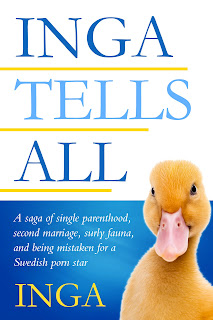[“Let Inga Tell You,” La Jolla Light, published November 28, 2022] ©2022
Even though Olof and I have been married for 27 years, I still find myself locked in the mindset of the twelve years between my two marriages when I lived a truly penurious existence.
During that time, nothing got repaired unless I could fix it with duct tape, picture wire, or hair scrunchies (a grossly under-rated tool) and nothing got replaced until it absolutely disintegrated.
Some months after Olof and I married, he put his arm around my shoulder as he was leaving for work one morning and queried plaintively, “Dear, if the market goes up another ten percent, could we get a new bath mat?”
My younger son, Henry, now 42, recalls growing up in poverty. Yes, here in La Jolla. Upon hearing this, Olof, never one to miss an opportunity to affectionately ride me about what he felt were my marginal housekeeping skills, replied, “No, you didn’t grow up in poverty. But you did grow up in squalor.”
Excuse me, but there are only so many hours in the day when you’re a working single mom of two carpool-intensive kids. I managed youth sports teams and was Pack Committee Chairman of La Jolla Cub Scouts in an era where all communication was by handouts or extremely inefficient “phone trees.” (Does anyone even know what those are anymore?) I am insanely envious of team managers who can just post maps to game locations on a website. I, meanwhile, did quite a few Cub Scout mailings in stop-and-go traffic on Torrey Pines Road on my way home from work.
An avid journal keeper and chronicler throughout my life, I sometimes consult my journals to check recollections for columns. Recently, I came upon this except from a conversation with Henry, almost 10, dated March 9, 1990. Rollerblades were the new fad toy and Henry was convinced he was the only kid who didn’t own a pair. He sat glumly in the back seat as we drove home from school.
"What's the matter, sweetheart?" I asked.
"Everybody we know is richer than we are," said Henry.
"Well, you got that right," I said. We rode silently for a while.
"Henry," I said finally, "what you need to understand is that we are not poor. We just don't have any money."
Henry rolled his eyes. "So what's the difference?"
"Well, we own our own home. OK, several financial institutions own our home. But that's a big deal these days. What we don't have is cash."
"Jamie's pool is bigger than our whole house," said Henry. "And they go to Hawaii every Christmas and skiing every Thanksgiving. And they have a phone in their car. And he get five dollars for every A."
"Sweetheart, no matter where you go, someone is going to have more than you. And even if Donald Trump [yes, I really wrote that!] proposed to me tomorrow, you'd still have to do chores. Richness is relative."
"Only poor people say that."
"OK, then. We could move to the barrio. Then we'd be 'rich'."
"Yeah, but they shoot at you there."
"Hey, you wanna be rich or not?"
Everything that went wrong with the house was on me. A friend astutely observed soon after I took over ownership, “You need a lover who likes gardening and pool maintenance.”
I had traded every asset of the marriage plus taken out a second mortgage (co-signed by my wonderful father after banks laughed in my face) to buy my ex out of our house. It was the best financial decision I’ve ever made but my entry level job and child support didn’t begin to cover the costs of living here
The house just got shabbier and shabbier until Olof married me and undertook some serious self-preserving improvements. Like central heat, and an upgrade to our 50-amp fuse box. He was tired of the kids using the toaster oven and blowing him off his computer.
I recently wrote a column about loving to sit outside on fall evenings listening to the Zen sound of crickets chirping. I observed that communing with nature like this made up for all the years when the only thing I communed with was my watch.
I remember nights back then when I would have gotten the laundry done and piled it on the bed at 11 p.m., only to fall asleep on top of it soon after. I didn’t even read one book a year. If I had ten spare minutes between car pools, I took a combat nap
I just feel tired even thinking back on it. I guess you just do what is required at the time. I certainly wasn’t spending a lot of time pondering the meaning of life.
And, yes, we did get a new bath mat, although, frankly, I felt the old one still had life in it. I could have kept its ratty self going for at least another year.
